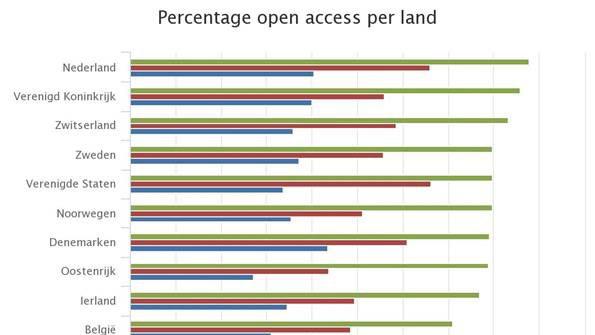The Netherlands front runner in open access

Of all scientific articles (co-)published in 2016 by Dutch authors, 44 percent was open access. This number was only 20 percent in 2002. With this increase, the Rathenau Institute says, the Netherlands are ahead of neighbouring countries.
In comparison, the percentage of open access articles in Belgium is 36 percent; in Germany, 33 percent; and in France, 30 percent. Only the United Kingdom, with 43 percent open access, comes close to Dutch scientists’ figures.
Ambition
In September 2018, research financier NOW, along with the European Research Council and ten European research financiers, agreed that starting in 2020, all new scientific articles should be available to everyone for free. The expectation is that open access will lead to a larger scale, broader use of scientific knowledge.
But open access is still cause for many questions: who will pay for transition and publication, and how can the quality be guaranteed? “Generally, scientists support the principles of open access, but they do wish to keep publishing in high-impact magazines, who rarely work with open access,” says Alexandra Vennekens, senior researcher at the Rathenau Institute. “They’re uncertain of how they will be assessed if they aren’t publishing their work in important magazines. Additionally, the findability of articles in (open access) repositories is another concern.”
Expensive subscriptions
In the current system, scientific publishers are very powerful. In this system, scientists don’t have to pay for their publications, but they are paying – through their universities and knowledge institutions – for expensive subscriptions to get access to publications. Outsiders can only access them through libraries that have subscriptions.
Open access comes in many different types of publications: through open access magazines or an open article in a paid subscription magazine (gold), through a digital repository of, for example, a university (green), or through a publisher’s platform of which the licensing is unclear (bronze).
Golden route
The Rathenau Institute’s study also shows the percentage of open access publications in the Netherlands published through the golden route saw the biggest increase: from 4 percent in 2002, to 58 percent in 2016. A large part of these articles is also available through repositories (green route). Although there was a clear acceleration in the increase, the question remains whether the Netherlands will succeed in meeting the goal of 100 percent in 2020.
Researchers at the Rathenau Institute stress that collecting open access data is ‘work in progress’. It’s not always possible to definitively state for each publication whether it’s available open access. It’s also possible some publications only become freely accessible at a later date.